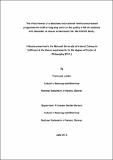| dc.description.abstract | Background
There is a growing appreciation of the potential use of psychosocial interventions in maintaining or improving the quality of life of people with dementia residing in long-stay care settings. Reminiscence is a psychosocial intervention commonly used in dementia and involves the discussion of past activities, events and experiences with another person or group of people, usually with the aid of tangible prompts such as photographs or other familiar items. However, despite being widely used in dementia care, evidence on the effectiveness of reminiscence as a psychosocial intervention for people with dementia residing in long-stay settings is uncertain.
Aims
The aim of this study was to evaluate the effectiveness of a structured educational reminiscence-based programme for staff in long-stay units on the quality of life of residents with dementia.
Methods
The DARES study was a two-group, single-blind cluster randomised trial (ISRCTN99651465), conducted in public and private long-stay residential settings in Ireland. Randomisation to control and intervention was at the level of the long-stay residential unit. Sample size calculations suggested that 18 residential units each containing 17 people with dementia were required for randomisation to control and intervention groups to achieve power of at least 80% with alpha levels of 0.05. Each resident in the intervention group was linked with a nurse and care assistant who had completed the structured reminiscence-based education programme. Residents allocated to the control group received usual care. The primary outcome was quality of life of residents as measured by the Quality of Life-AD instrument. Secondary outcomes included staffs' perception of the residents' quality of life, residents' perceived levels of agitation, depression and staffs' perceived burden of care. Blinded outcome assessment was undertaken at baseline and at 18-22 weeks post-randomisation.
Findings
Using an intention to treat complete case analysis, on average, there was no statistical significant difference, between residents allocated to the SERPS and residents allocated to usual care. Estimated effect of the intervention on the quality of life of residents was 3.54 (95% CI -0.83 to 7.90, p=0.10), expressed as the difference in mean improvement between intervention and control group. When the three sites that did not implement the intervention to residents as prescribed were removed for the analysis, per-protocol analysis yielded a significant effect. Estimated effect of the intervention on the quality of life of residents was 5.22 (95% CI 0.11 to 10.34, p=0.04), exceeding the 4-point minimal clinical important difference defined at the outset of the trial.
Conclusion
Reminiscence may be an effective care option for people with dementia in long-stay settings with potential to impact positively on the quality of life of residents. | en_US |


